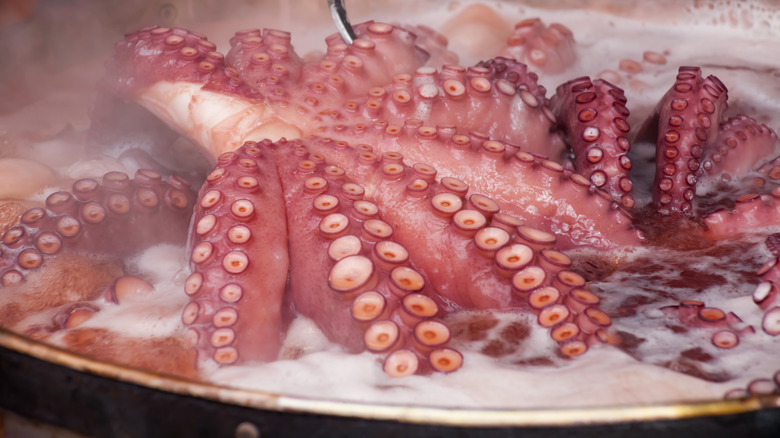Anthony Bourdain's Octopus Stock Is The Key To Richer Seafood Stew
As the great Anthony Bourdain wrote in "Medium Raw," "[W]ithout experimentation, a willingness to ask questions and try new things, we shall surely become static, repetitive, moribund." With that dogma in mind, what better way to switch things up than by making octopus stock at home? (Get ready to handle some tentacles.)
Octopus doesn't have to come fried in a basket at your local crab shack. Calamari is only the beginning. In one episode of "Parts Unknown," Bourdain hunted octopi on a speedboat off the coast of Molokai. And he dined on freshly-caught octopus in Lisbon, Portugal in an episode of "No Reservations." It's no surprise then that the chef had a personal recipe for octopus stock, which he shared in his cookbook "Appetites."
If you've never tried octopus before, its flavor isn't particularly fishy. It's slightly sweet and briny, comparable to lobster. The cephalopod's tender, mild profile makes it a great fit for picking up the flavors of marinades and sauces, but octopi offer a unique flavor of their own, ostensibly influenced by their carnivorous diet of other ocean creatures like shrimp, crabs, clams, snails, fish, and species of small sharks. As Bourdain wrote of his octopus stock in "Appetites," "This is an enchanted liquid that makes seafood stews richer, deeper, and better." The stock may be simple, but it adds major dimensionality to whatever dish it's used in, similar to how a few drops of oyster sauce instantly add depth and umami flavor to a seafood Bloody Mary.
An oceanic umami upgrade
Bourdain's unusual yet straightforward stock is a combination of octopus tentacles, whole black peppercorns, white or yellow onion, garlic, carrot, celery, and canola oil. To make it, heat the oil in a large stockpot "until it shimmers," then sear bite-size chunks of octopus in the oil; drain them on a separate plate, return them to the pot, and add the remaining ingredients. From there, simply fill the pot with cold water, bring it to a boil, and simmer for at least an hour. Once you've strained out the solids, the octopus stock is ready to use. You can refrigerate it or make a large batch and freeze it for easy access in future stews.
In addition to seafood stew, you could use your octopus stock to soak chorizo and potatoes or to add a taste of the sea to your next dip. Incorporate it into this Mexican-inspired grilled octopus and ancho salsa recipe. Or, add a generous slug to your next New England clam chowder or lobster and corn chowder.
Making Bourdain's octopus stock gives you a reason to visit a local fishmonger. If you don't happen to live near one, you'll find options like NYC-based Fulton Fish Market that sell online and ship nationwide. Costco sells a 5 ¼-pound pack of El Rey Del Pulpo frozen cooked octopus tentacles. Other online seafood retailers like Fresh Fin and Wholey also sell a variety of octopi.

